|
The games 1, 2 and 5 -- if necessary
-- will be home
games for the higher seeded team in this best-of-5
series. Injuries are turned off for the playoffs,
meaning a player can be injured only for that
particular game, but can return for the next game.
Pitching rotations are on a four-man skip rotation,
meaning the fourth starter will be skipped if the
first starter is ready to pitch. Since there are off
days off games 2 and 4, some game 1 starters will be
available in game 4 on three days' rest.
The top seed to survive this round
will take on the
No. 2 seed, the Hanover Division champion Newark
Sugar Bears; the lower-seeded survivor faces the Morris Division
winner, the top-seeded Arkansas Golden Falcons.
Carolina Mudcats (#3, 98-64) vs.
Tijuana Banditos
(#6, 80-83)
 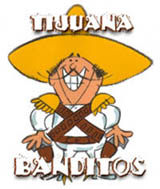 Every year needs a Cinderella story, and this
year the Fairy Godmother apparently visited Tijuana. After finishing
dead last in 2003 with a 66-96 record, the Banditos again looked like
they'd be playing golf again this October; as late as Week 15,
they were tied for 8th place (with the Hoboken
Cutters), 3½ games behind the sixth-place Vancouver Iron Fist for the final playoff spot,
and 8½ games behind the fifth-place Columbia
Rattlesnakes. But even as the Cutters, Iron Fist and Rattlesnakes
started their long slow decline toward the draft lottery, the Banditos
just kept quietly piling up wins. The Banditos pulled past the Cutters,
leap-frogged the Iron Fist and won seven out of their final 10 games to
pull into a flat-footed tie with the Rattlesnakes, and then
convincingly defeated them in a one-game
playoff. The 7-3 loss is just the latest tragic chapter in the
woeful history of the Rattlesnakes, the only surviving original
franchise to have never reached the post-season. But from the
perspective of the Banditos and the rest of the DMBL, it's a great
rags-to-riches story. The only problem is, the fairy tale could end
very quickly as Tijuana is going up against the third-ranked Mudcats, a
team that came within two games of claiming the Morris Division title
and the league's best record. Every year needs a Cinderella story, and this
year the Fairy Godmother apparently visited Tijuana. After finishing
dead last in 2003 with a 66-96 record, the Banditos again looked like
they'd be playing golf again this October; as late as Week 15,
they were tied for 8th place (with the Hoboken
Cutters), 3½ games behind the sixth-place Vancouver Iron Fist for the final playoff spot,
and 8½ games behind the fifth-place Columbia
Rattlesnakes. But even as the Cutters, Iron Fist and Rattlesnakes
started their long slow decline toward the draft lottery, the Banditos
just kept quietly piling up wins. The Banditos pulled past the Cutters,
leap-frogged the Iron Fist and won seven out of their final 10 games to
pull into a flat-footed tie with the Rattlesnakes, and then
convincingly defeated them in a one-game
playoff. The 7-3 loss is just the latest tragic chapter in the
woeful history of the Rattlesnakes, the only surviving original
franchise to have never reached the post-season. But from the
perspective of the Banditos and the rest of the DMBL, it's a great
rags-to-riches story. The only problem is, the fairy tale could end
very quickly as Tijuana is going up against the third-ranked Mudcats, a
team that came within two games of claiming the Morris Division title
and the league's best record.
Chris Pucci's
Mudcats are in the post-season for the fourth time in their eight-year
history, and for the third time in the last four years. In both 2001
and 2003, the Mudcats survived the first round, only to be bounced out
of the playoffs at the hands of the Newark Sugar
Bears. (Interestingly enough, if the Mudcats do defeat the Banditos
and move on, they're guaranteed of facing the Sugar Bears in the next
round.) Their first-ever playoff appearance came in 1999, and that time
too they survived the first round, only to be swept out of the playoffs
by the Arkansas Golden Falcons. So if history
tells us anything, it's that the Mudcats survive the first round!
Another precedent in the Mudcats favor: The No. 6 seed has knocked out
the No. 3 seed just one time in the seven years of the three-tiered
playoff system, and that one upset -- in 2001 -- was pulled off by
these same Mudcats, who upset the Vatican City
Cardinals in five games. And it's not just ancient history that has
the Mudcats feeling good about themselves for this match-up: Carolina
took the season series against Tijuana, 9 games to 4; the Banditos'
80-83 record (.491) is the worst record of any playoff team in DMBL
history; and they were 38-44 (.463) away from Tijuana, the second-worst
road record of any playoff team this season. That last statistic is
especially damning because three of the five games will be played in
Carolina, where the Mudcats have the league's fourth-best home record
(49-32) and went 5-2 when hosting the Banditos this season. It may look
bleak for Tijuana, but then again, it looked even bleaker in Week 15.
Tijuana GM Paul
Barbosa got his team to the post-season for the third time in five
years on the strength of a very good offense and a very good bullpen.
The rest is a work in progress. The Banditos scored a fourth-best 853
runs but allowed a sixth-worst 844 runs, for a sixth-best +9 run
differential, and finished near the bottom of the pack in team defense.
But as befitting a Cinderella team, they're all about the intangibles:
They were 13-7 in extra-inning games, 14-4 in games tied after 7
innings, and had 14 come-from-behind wins when losing after 7 innings,
all league highs this year.
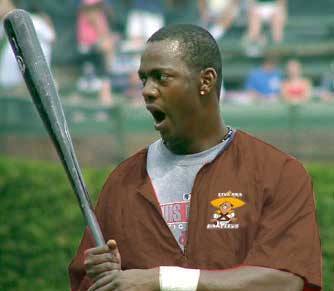 The offense is solid, ranking second in home
runs (232) and fifth in team batting average (.278); however, the fact
that they finished third in OPS (.805), OBP (.347), SLG (.458), runs
created (905.4) and total average (.765) suggests this lineup should
have generated even more than their fourth-best 853 runs. The key to
the offense is lead-off hitter and Kevin
Mitchell Award
candidate Edgar Renteria, who led the league
in hits (230) and runs (124), was second in stolen base percentage
(.815), tied for second in doubles (49), and ranked fourth in stolen
bases (22); fifth in batting average (.322); sixth in runs created
(131.6); and seventh in OBP (.399). He also had a 31-game hitting
streak, the second-longest (by one game!) in league history. But
perhaps the most telling statistic was that Renteria was tied for
fourth with 13 intentional walks -- as a lead-off hitter! But even if
opposing pitchers can find a way to deal with Renteria, they also have
to deal with three other All-Stars in the lineup: Hank
Blalock (.322, .890 OPS, 27 HR, 88 RBI), Bret
Boone (.277, .829 OPS, 29 HR, 110 RBI) and Ramon
Hernandez (.323, .855 OPS, 18 HR, 77 R). And, oh yeah, Vladimir Guerrero (.310, .929 OPS, 35 HR, 100
RBI). The offense is solid, ranking second in home
runs (232) and fifth in team batting average (.278); however, the fact
that they finished third in OPS (.805), OBP (.347), SLG (.458), runs
created (905.4) and total average (.765) suggests this lineup should
have generated even more than their fourth-best 853 runs. The key to
the offense is lead-off hitter and Kevin
Mitchell Award
candidate Edgar Renteria, who led the league
in hits (230) and runs (124), was second in stolen base percentage
(.815), tied for second in doubles (49), and ranked fourth in stolen
bases (22); fifth in batting average (.322); sixth in runs created
(131.6); and seventh in OBP (.399). He also had a 31-game hitting
streak, the second-longest (by one game!) in league history. But
perhaps the most telling statistic was that Renteria was tied for
fourth with 13 intentional walks -- as a lead-off hitter! But even if
opposing pitchers can find a way to deal with Renteria, they also have
to deal with three other All-Stars in the lineup: Hank
Blalock (.322, .890 OPS, 27 HR, 88 RBI), Bret
Boone (.277, .829 OPS, 29 HR, 110 RBI) and Ramon
Hernandez (.323, .855 OPS, 18 HR, 77 R). And, oh yeah, Vladimir Guerrero (.310, .929 OPS, 35 HR, 100
RBI).
The Banditos do have a legitimate ace
(and Ben McDonald Award
candidate) in Javier Vazquez (15-6, 3.42 ERA,
11.1 R/9). But the rest of the rotation is cover-your-eyes awful, and
manager Dennis Martinez will have a couple
sleepless nights trying to figure out who to start in Games 2 and 3: 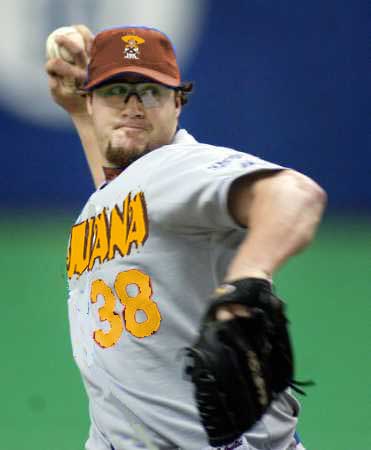 Ryan Franklin (8-13, 5.15 ERA, 14.8 R/9)? Josh Beckett (8-10, 5.59 ERA, 15.6 R/9)? Hideo Nomo (5-10, 6.04 ERA, 15.5 R/9)? Tim Redding (4-5, 5.59 ERA, 15.6 R/9)? We're
going to throw another name into the mix here -- the first pick in this
year's draft, 21-year-old southpaw rookie Dontrelle
Willis. While the kid has been taking regular beatings from the
league this year (4-16, 6.05 ERA, 16.0 R/9), Carolina actually fared
worse against lefty starters (25-22) than against righties (73-42), so
maybe he deserves a shot... If the Tijuana starters, whoever they may
be, can keep the game close enough, the Banditos do have the ability to
turn any game into a 7-inning affair, thanks to one of the league's
best bullpen trios. Closer Eric Gagne (1.47
ERA, 7.5 R/9) had an incredible season, winning 12 games and saving 22
more against just one loss and two blown saves; he also struck out an
eye-popping 148 batters in 97.2 IP, while just walking 20. He's got a
great pair of set-up men in lefty Dan Plesac
(2-3, 3 SV, 2.37 ERA, 11.1 R/9) and righty Guillermo
Mota (9-6, 4 SV, 2.71 ERA, 11.2 R/9). But it's not a good sign if
they have to use long relief man Jose Valverde
(7-6, 4.65 ERA, 12.0 R/9), and it could get real ugly if they turn to Danys Baez (3-4,
7.38 ERA, 17.8 R/9). Ryan Franklin (8-13, 5.15 ERA, 14.8 R/9)? Josh Beckett (8-10, 5.59 ERA, 15.6 R/9)? Hideo Nomo (5-10, 6.04 ERA, 15.5 R/9)? Tim Redding (4-5, 5.59 ERA, 15.6 R/9)? We're
going to throw another name into the mix here -- the first pick in this
year's draft, 21-year-old southpaw rookie Dontrelle
Willis. While the kid has been taking regular beatings from the
league this year (4-16, 6.05 ERA, 16.0 R/9), Carolina actually fared
worse against lefty starters (25-22) than against righties (73-42), so
maybe he deserves a shot... If the Tijuana starters, whoever they may
be, can keep the game close enough, the Banditos do have the ability to
turn any game into a 7-inning affair, thanks to one of the league's
best bullpen trios. Closer Eric Gagne (1.47
ERA, 7.5 R/9) had an incredible season, winning 12 games and saving 22
more against just one loss and two blown saves; he also struck out an
eye-popping 148 batters in 97.2 IP, while just walking 20. He's got a
great pair of set-up men in lefty Dan Plesac
(2-3, 3 SV, 2.37 ERA, 11.1 R/9) and righty Guillermo
Mota (9-6, 4 SV, 2.71 ERA, 11.2 R/9). But it's not a good sign if
they have to use long relief man Jose Valverde
(7-6, 4.65 ERA, 12.0 R/9), and it could get real ugly if they turn to Danys Baez (3-4,
7.38 ERA, 17.8 R/9).
Outside of the three starts Vazquez
is sure to get if this series goes long enough, Tijuana's best bet is
to get into a slowpitch softball-style slugging match with the Mudcats,
because there's no way Carolina's offense can go toe-to-toe with
Tijuana's. The 'Cats offense scored just 766 runs this year, the 9th
fewest in baseball; outside of Aubrey Huff (.338,
.960 OPS, 50 2B, 113 R), this is a very one-dimensional offense, with
lots of high-power, high-strikeout guys: Richard
Hidalgo (..273, 25 HR, 136 K); Richie Sexson (..268,
40 HR, 148 K); Jim Edmonds (.249, 45 HR, 189
K); Angel Berroa (.258, 10 HR, 117 K) and Aramis Ramirez (.222, 24 HR, 100 K). Embracing
the exact opposite of his style as a player, manager Lenny Dykstra seldom does anything except sit
back and wait for the longball: the Mudcats were last in stolen bases
(27) and stolen base percentage (.600), and third from the bottom in
stolen base attempts (45).
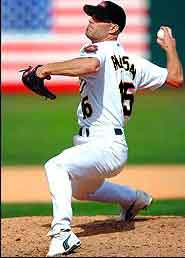 But then again, why not play for the
three-run home run, when that's usually more than enough to win on any
given night? The Mudcats led the league in team ERA (3.48), quality
start percentage (.611) and fewest HR/9 (0.8); tied for first in R/9
(12.0); and ranked second in fewest H/9 (8.3). In a short series, this
pitching staff will be even better as they can narrow the rotation to
their top three starters. Tim Hudson (17-3,
2.08 ERA, 10.8 R/9) and Roy Halladay (18-7,
3.62 ERA, 10.2 R/9) are the likely starters for games 1 and 2, but what
to do next: Carlos Zambrano (11-13, 3.14 ERA,
11.2 R/9) or Barry Zito (18-4, 3.96 ERA, 13.3
R/9)? You can forget about Jake Westbrook (4-2,
4.33 ERA, 14.0 R/9) and Ron Villone (4-11,
6.22 ERA, 15.4 R/9)... The Mudcats' embarrassment of riches when it
comes to young arms also extends to the bullpen, where Francisco Cordero (6-3, 4 SV, 2.28 ERA, 9.9
R/9), Brandon Donnelly (5-7, 7 SV, 2.42 ERA,
11.9 R/9) and Ricardo Rincon (4-1, 2.67 ERA,
15.0 R/9) reign. Indeed, closer Rod Beck (3-9,
34 SV, 3.69 ERA, 11.9 R/9) may be the bullpen's weakest link -- unless,
that is, Paul Shuey (3-1, 4.20 ERA, 12.6 R/9)
or Ray King (5-3, 2 Sv, 4.96 ERA, 13.5 R/9)
are called upon for some reason. But then again, why not play for the
three-run home run, when that's usually more than enough to win on any
given night? The Mudcats led the league in team ERA (3.48), quality
start percentage (.611) and fewest HR/9 (0.8); tied for first in R/9
(12.0); and ranked second in fewest H/9 (8.3). In a short series, this
pitching staff will be even better as they can narrow the rotation to
their top three starters. Tim Hudson (17-3,
2.08 ERA, 10.8 R/9) and Roy Halladay (18-7,
3.62 ERA, 10.2 R/9) are the likely starters for games 1 and 2, but what
to do next: Carlos Zambrano (11-13, 3.14 ERA,
11.2 R/9) or Barry Zito (18-4, 3.96 ERA, 13.3
R/9)? You can forget about Jake Westbrook (4-2,
4.33 ERA, 14.0 R/9) and Ron Villone (4-11,
6.22 ERA, 15.4 R/9)... The Mudcats' embarrassment of riches when it
comes to young arms also extends to the bullpen, where Francisco Cordero (6-3, 4 SV, 2.28 ERA, 9.9
R/9), Brandon Donnelly (5-7, 7 SV, 2.42 ERA,
11.9 R/9) and Ricardo Rincon (4-1, 2.67 ERA,
15.0 R/9) reign. Indeed, closer Rod Beck (3-9,
34 SV, 3.69 ERA, 11.9 R/9) may be the bullpen's weakest link -- unless,
that is, Paul Shuey (3-1, 4.20 ERA, 12.6 R/9)
or Ray King (5-3, 2 Sv, 4.96 ERA, 13.5 R/9)
are called upon for some reason.
The bottom line:
We love a Cinderella Story as much as the next guy, but this one
appears to be drawing to a quick conclusion. The short series favors
terrific pitching; even if the two excellent bullpens cancel each other
out, the Mudcats have a far better starting rotation. But the Banditos
do have a chance to win any game when Vazquez is starting, and their
offense is capable of shredding any DMBL pitcher, even the likes of
Hudson and Halladay. Maybe there's still some pixie dust left in
Tijuana after all.
Stanhope Mighty
Men (#4, 95-67)
vs. Honolulu Sharks (#5, 83-79)
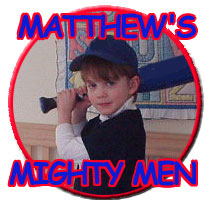 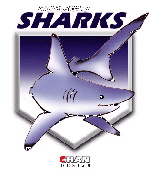 For the
second consecutive year, the Sharks are the fifth-seed. In previous
years, that would be considered good news, as the No. 5 team
had upset the No. 4 team in all six years of the three-tiered
post-season. But last year, the string of upsets came to an end as
Honolulu, in their first-ever post-season appearance, were eliminated
by Carolina in a hum-dinger of a five-game series. For the
second consecutive year, the Sharks are the fifth-seed. In previous
years, that would be considered good news, as the No. 5 team
had upset the No. 4 team in all six years of the three-tiered
post-season. But last year, the string of upsets came to an end as
Honolulu, in their first-ever post-season appearance, were eliminated
by Carolina in a hum-dinger of a five-game series.
After enduring 90+ loss seasons for
the first five years of its history, two straight post-season
appearances might be enough to keep Shark fans sated. But it wouldn't
be enough for GM Adam
Kozubal, who has been steadily building this franchise toward
greatness over the
last three
seasons. In '02, the team wente
80-82 and missed the playoffs by just one game; last year, they were
82-80 but were knocked out in the first round. This year, after
going 83-79, the next logical step may not be the World Series, but it
certainly isn't first-round elimination.
This is also the second consecutive
post-season
appearance for the Mighty Men, but this franchise has enjoyed far more
success -- they reached the playoffs for four straight seasons
(1998-2001), a run that included the 2000 World's Championship. Great
things were expected again this season, after the pundits
picked Stanhope as the Hanover Division favorite. Expectations were
only stoked higher after GM David Landsman
traded for eight
big-name players, giving his roster the equivalent of a 21-man
protected list! But there was much gnashing of teeth in Stanhope when
the team not only came up short in their bid for the league's best
record, but also failed to win the division, or even claim the top
wild-card seed. Can they shake off the disappointment and start a new
streak of No. 4's
over No. 5's, or will the Sharks be able to swim into Round 2 for the
first time in their franchise history?
Stanhope combines the league's
second-best offense (921 runs scored) with its fifth-best defense (754
runs allowed), for a second-best +167 run differential. That's right --
their run-diff is two rungs higher than their overall record. The Pythagorean
Theorem suggests that the Mighty Men are really two games better
than their record, and "should" be 97-65, with the second-best record
in baseball. (Unfortunately for the Mighty Men, Pythagoras likes the
Sugar Bears even better, figuring that they should still win the
division title by four games, on the strength of what should have been
a 101-61 record.) Stanhope was particularly tough at home, with a
third-best 50-31 (.617) record; they also crushed lefty starters, with
a league-best 35-12 (.745) record against them. And, with one of the
game's best closers anchoring their bullpen, you might as well turn out
the lights when Stanhope is even or ahead after 7 innings: They went
89-12 (.881 W%), the second-highest winning percentage in such
situations this year.
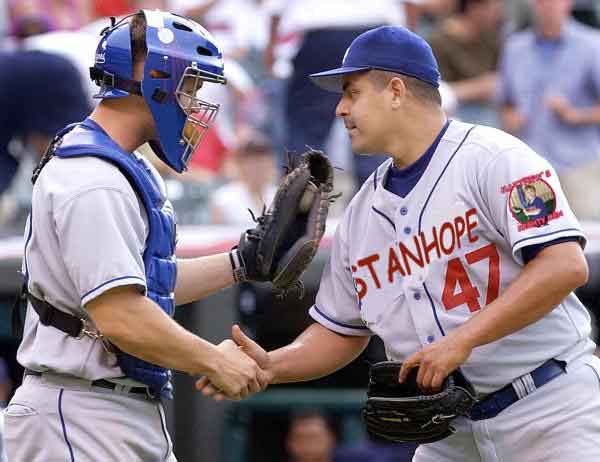 One of Stanhope's regular season strengths,
the depth and quality of its starting rotation, won't help it much in
the five-game series, when only three starters will be able to pitch.
Manager Graig Nettles has the enviable task of
having to sort through some very good veterans when it comes to finding
his three starters. His ace this season was the team's top pick in this
year's draft (#26 overall), Wilson Alvarez,
who went 17-6 with a 3.52 ERA, 13.2 R/9; he'll likely start Game 1,
even though the Sharks, like the Mighty Men, are a much better team
against lefties (.554 W%) than they are against righties (.491 W%).
Backing up Alvarez will likely be the two starters the team traded for,
Estaban Loaiza (5-4, 4.01
ERA, 11.1 R/9 in 11 starts with Stanhope; 13-10, 4.52 ERA, 13.1 R/9
overall); and Mike Mussina (4-3, 4.16 ERA,
11.2 R/9 in 10 starts with Stanhope; 13-11, 4.43 ERA, 11.9 R/9
overall). Nettles' other choices are Brian Anderson
(10-10, 4.61 ERA, 13.5 R/9), Tim Wakefield (8-6,
5.18 ERA, 15.4 R/9), Matt Clement (9-7, 5.52
ERA, 15.1 R/9) or Kerry Wood (12-14, 5.62
ERA, 13.9 R/9), all talented pitchers having sub-par seasons... Whoever
starts Stanhope's games, there's no doubt as to who will finish them. Mariano Rivera didn't win the Dennis Eckersley Reliever of the Year Award
this season, but he's still one of the toughest closers in baseball,
going 6-8 with 32 saves (6 blown saves) with a 3.20 ERA, 10.9 R/9. At
the start of the season, Rivera was backed up by a formidable one-two
punch in Paul Quantrill (11-3, 2 SV, 2.50
ERA) and Brian Fuentes (5-2, 2 SV, 3.53 ERA);
things got even tougher after Stanhope traded for another lefty-righty
combo in Shigetoshi Hasegawa (6-1, 12 SV,
2.66 ERA) and Rheal Cormier (1-6, 3 SV, 4.29
ERA). One of Stanhope's regular season strengths,
the depth and quality of its starting rotation, won't help it much in
the five-game series, when only three starters will be able to pitch.
Manager Graig Nettles has the enviable task of
having to sort through some very good veterans when it comes to finding
his three starters. His ace this season was the team's top pick in this
year's draft (#26 overall), Wilson Alvarez,
who went 17-6 with a 3.52 ERA, 13.2 R/9; he'll likely start Game 1,
even though the Sharks, like the Mighty Men, are a much better team
against lefties (.554 W%) than they are against righties (.491 W%).
Backing up Alvarez will likely be the two starters the team traded for,
Estaban Loaiza (5-4, 4.01
ERA, 11.1 R/9 in 11 starts with Stanhope; 13-10, 4.52 ERA, 13.1 R/9
overall); and Mike Mussina (4-3, 4.16 ERA,
11.2 R/9 in 10 starts with Stanhope; 13-11, 4.43 ERA, 11.9 R/9
overall). Nettles' other choices are Brian Anderson
(10-10, 4.61 ERA, 13.5 R/9), Tim Wakefield (8-6,
5.18 ERA, 15.4 R/9), Matt Clement (9-7, 5.52
ERA, 15.1 R/9) or Kerry Wood (12-14, 5.62
ERA, 13.9 R/9), all talented pitchers having sub-par seasons... Whoever
starts Stanhope's games, there's no doubt as to who will finish them. Mariano Rivera didn't win the Dennis Eckersley Reliever of the Year Award
this season, but he's still one of the toughest closers in baseball,
going 6-8 with 32 saves (6 blown saves) with a 3.20 ERA, 10.9 R/9. At
the start of the season, Rivera was backed up by a formidable one-two
punch in Paul Quantrill (11-3, 2 SV, 2.50
ERA) and Brian Fuentes (5-2, 2 SV, 3.53 ERA);
things got even tougher after Stanhope traded for another lefty-righty
combo in Shigetoshi Hasegawa (6-1, 12 SV,
2.66 ERA) and Rheal Cormier (1-6, 3 SV, 4.29
ERA).
There's nothing fancy about the
Mighty Man offense: They just rake. Stanhope led the league in home
runs (236) and finished second in OPS (.828), OBP (.359), SLG (.469),
walks (650) and runs created (944.3). They also were third in batting
average (.283) and fourth in doubles (307). 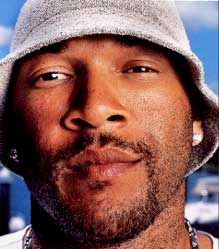 Interestingly enough, they had the league's top
offense (495 RF) over the first half, but cooled to a fourth-best 426
runs over the second half, despite the addition of several sluggers via
trade. One of those new faces went on to have one of the most explosive
offensive seasons in DMBL history: Gary Sheffield, who hit .331 with a 1.039 OPS in 112
games with Stanhope (35 2B, 31 HR, 104 RBI). But just about every
hitter in the Mighty Man lineup had terrific stats this season: Milton Bradley (.327, 42 2B, 71 RBI); Carlos Lee (.312, 21 HR, 74 RBI); Todd Helton (.294, 43 2B, 111 RBI); Mike Lowell (.286, 47 HR, 107 RBI), Derek Jeter (.297, 28 2B, 112 R), Nick Johnson (.285, .870 OPS, 26 HR, 106 RBI) and
Jorge Posada (..285, 25 HR,
79 RBI) all put up the kind of numbers that would make them team MVP,
if they played for a team that didn't have Sheffield on it. And that
doesn't even include part-timers Brian Giles
(.271, 12 2B, 25 R in 52 G), Cliff Floyd
(.260, 22 HR, 63 RBI in 91 G) and Brad Wilkerson
(.298, .418 OBP, 25 R in 59 G). Interestingly enough, they had the league's top
offense (495 RF) over the first half, but cooled to a fourth-best 426
runs over the second half, despite the addition of several sluggers via
trade. One of those new faces went on to have one of the most explosive
offensive seasons in DMBL history: Gary Sheffield, who hit .331 with a 1.039 OPS in 112
games with Stanhope (35 2B, 31 HR, 104 RBI). But just about every
hitter in the Mighty Man lineup had terrific stats this season: Milton Bradley (.327, 42 2B, 71 RBI); Carlos Lee (.312, 21 HR, 74 RBI); Todd Helton (.294, 43 2B, 111 RBI); Mike Lowell (.286, 47 HR, 107 RBI), Derek Jeter (.297, 28 2B, 112 R), Nick Johnson (.285, .870 OPS, 26 HR, 106 RBI) and
Jorge Posada (..285, 25 HR,
79 RBI) all put up the kind of numbers that would make them team MVP,
if they played for a team that didn't have Sheffield on it. And that
doesn't even include part-timers Brian Giles
(.271, 12 2B, 25 R in 52 G), Cliff Floyd
(.260, 22 HR, 63 RBI in 91 G) and Brad Wilkerson
(.298, .418 OBP, 25 R in 59 G).
Stanhope's awesome lineup contrasts
nicely with the Sharks, who had the league's
second-worst offense. They scored fewer runs (711) than any team in
baseball save the 13th-place Westwood Deductions
(683). Naturally, with that kind of anemic offensive production, the
Sharks had to have a hell of a pitching staff to have reached the
post-season. The Sharks finished 4th in fewest runs allowed (736), and
tied for the league lead in fewest BR/9 IP (12.0); they also ranked
first in fewest H/9 (8.3), fifth in most K/9 (7.0) and tied for fifth
in fewest HR/9 (1.2). The pitching staff was well-balanced, with the
starters finishing second in QS% (.537) and tied for third in CG%
(.093), while the relievers led the league in save percentage (.784)
and were seventh in lowest percentage of inherited runners scored
(.285). While the starting rotation doesn't have any Ben McDonald Award candidates this
year, Honolulu pitching coach Randy Myers has
done a great job developing some fine young hurlers. 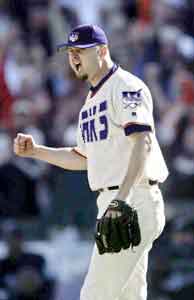 Coming out of nowhere to anchor the rotation
this year was Jason Schmidt (13-11, 3.54 ERA,
10.1 R/9), who had been 12-23 with a 5.39 ERA over his previous two
seasons with the Sharks, and 36-54 with a 5.32 ERA over his five-year,
six-team DMBL career. But the 30-year-old right-hander impressively led
the DMBL in fewest BR/9 (10.1), and finished 2nd in H/9 (7.5); 3rd in
QS% (.742); 7th in ERA (3.54) and strikeouts (203); 8th in innings
(224.0); tied for 8th in complete games (4); and tied for 9th in K/9
(8.2). Schmidt and 25-year-old Roy Oswalt
(13-13, 4.02 ERA,
11.8 R/9) will probably start the first two games, but who
will they start in
Game 3? Lefties Mark Mulder (11-12, 4.56 ERA,
13.0 R/9) and Ted Lilly (8-12, 5.25 ERA, 13.4
R/9) may have bright futures ahead of them, but their regular season
numbers inspire little confidence. The Sharks are also tempting fate by
sending any southpaw out against Stanhope's lefty-killing lineup; the
Mighty Men went a league-best 35-12 (.745 W%) against them this season.
That alone might be reason enough to turn to Russ
Ortiz (11-15, 4.70 ERA, 12.2 R/9) in Game 3, and then hope the long
intercontinental flight is enough time for Schmidt and Oswalt to rest
up for Games 4 and 5, if necessary. Spot starter Jason
Johnson (2-4, 7.22 ERA, 17.9 R/9) probably won't even make the
post-season roster, let alone the rotation... But if the Shark starters
can survive the first six innings of the game, they have an excellent
chance of winning the game: Honolulu had the league's second-best
record (65-3) when ahead after seven innings, and had the league's
second-best record (26-18) in one-run games. Veteran closer Ugueth Urbina (5-6, 28 SV, 3.58
ERA, 10.0 R/9) is solid, but the real strength in the bullpen is the
one-two punch of lefty Kelly Wunsch (3-3, 4
SV, 13 holds, 2.72 ERA, 11.9 R/9, .333 IR%)
and righty Rafael Soriano (9-1, 4 SV, 13
holds, 2.51 ERA, 8.0 R/9, .233 IR%). Coming out of nowhere to anchor the rotation
this year was Jason Schmidt (13-11, 3.54 ERA,
10.1 R/9), who had been 12-23 with a 5.39 ERA over his previous two
seasons with the Sharks, and 36-54 with a 5.32 ERA over his five-year,
six-team DMBL career. But the 30-year-old right-hander impressively led
the DMBL in fewest BR/9 (10.1), and finished 2nd in H/9 (7.5); 3rd in
QS% (.742); 7th in ERA (3.54) and strikeouts (203); 8th in innings
(224.0); tied for 8th in complete games (4); and tied for 9th in K/9
(8.2). Schmidt and 25-year-old Roy Oswalt
(13-13, 4.02 ERA,
11.8 R/9) will probably start the first two games, but who
will they start in
Game 3? Lefties Mark Mulder (11-12, 4.56 ERA,
13.0 R/9) and Ted Lilly (8-12, 5.25 ERA, 13.4
R/9) may have bright futures ahead of them, but their regular season
numbers inspire little confidence. The Sharks are also tempting fate by
sending any southpaw out against Stanhope's lefty-killing lineup; the
Mighty Men went a league-best 35-12 (.745 W%) against them this season.
That alone might be reason enough to turn to Russ
Ortiz (11-15, 4.70 ERA, 12.2 R/9) in Game 3, and then hope the long
intercontinental flight is enough time for Schmidt and Oswalt to rest
up for Games 4 and 5, if necessary. Spot starter Jason
Johnson (2-4, 7.22 ERA, 17.9 R/9) probably won't even make the
post-season roster, let alone the rotation... But if the Shark starters
can survive the first six innings of the game, they have an excellent
chance of winning the game: Honolulu had the league's second-best
record (65-3) when ahead after seven innings, and had the league's
second-best record (26-18) in one-run games. Veteran closer Ugueth Urbina (5-6, 28 SV, 3.58
ERA, 10.0 R/9) is solid, but the real strength in the bullpen is the
one-two punch of lefty Kelly Wunsch (3-3, 4
SV, 13 holds, 2.72 ERA, 11.9 R/9, .333 IR%)
and righty Rafael Soriano (9-1, 4 SV, 13
holds, 2.51 ERA, 8.0 R/9, .233 IR%).
But if Honolulu's pitching staff
can't keep the games close, the Sharks are in serious trouble.
Honolulu's offense ranked near the bottom in just about every category:
11th in doubles (259); tied for 11th in home runs (164); 12th in OBP
(.322); 13th in runs scored (711) and batting average (.247); and dead
last in OPS (.712), SLG (.390) , total bases (2165) and runs created
(708.4). 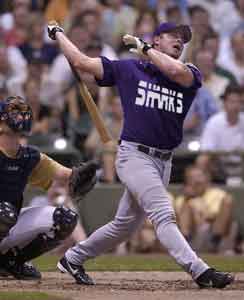 But the Sharks do some things right on offense:
They finished 5th in most walks (536), 4th in fewest strikeouts (991)
and 2nd in best stolen base percentage (.807). The strategy, then,
appears to be simple: Work the pitcher for a walk, steal second, and
then wait for Jason Giambi to come to the
plate. For the second straight season, "The Giambino" was the Sharks'
only offensive weapon, leading the team in OBP (.429), SLG (.608), OPS
(1.038), home runs (50), runs (112), runs created (147.4), total
average (1.213), secondary average (.618), extra base hits (76), total
bases (312), walks (140) and, naturally, intentional walks (15) --
despite hitting just .263, and striking out 134 times. In fact, Giambi
led the league in home runs, walks and secondary average, was second in
OBP and total average, tied for second in OPS, and third in SLG and
runs created. One can only imagine what kind of damage he would have
done with some more protection in the lineup. But while his teammates
did not put up huge numbers this regular season, there are some proven
big-name hitters capable of sending any starting pitcher to an early
shower: Miguel Tejada (.268, .752 OPS, 21 HR,
85 RBI), Shawn Green (.248, .764 OPS, 40 2B,
106 RBI), Jacques Jones (.272, .717 OPS, 20
HR, 69 RBI), Joe Randa (.233, .634 OPS, 23 2B,
54 RBI) and Jason Kendall (.268, .361 OBP, 53
R). If one of those guys, or first-round bust Bo
Hart (.229, .590 OPS), starts hitting up to their potential,
Honolulu's morbid offense would suddenly look a lot more dangerous. But the Sharks do some things right on offense:
They finished 5th in most walks (536), 4th in fewest strikeouts (991)
and 2nd in best stolen base percentage (.807). The strategy, then,
appears to be simple: Work the pitcher for a walk, steal second, and
then wait for Jason Giambi to come to the
plate. For the second straight season, "The Giambino" was the Sharks'
only offensive weapon, leading the team in OBP (.429), SLG (.608), OPS
(1.038), home runs (50), runs (112), runs created (147.4), total
average (1.213), secondary average (.618), extra base hits (76), total
bases (312), walks (140) and, naturally, intentional walks (15) --
despite hitting just .263, and striking out 134 times. In fact, Giambi
led the league in home runs, walks and secondary average, was second in
OBP and total average, tied for second in OPS, and third in SLG and
runs created. One can only imagine what kind of damage he would have
done with some more protection in the lineup. But while his teammates
did not put up huge numbers this regular season, there are some proven
big-name hitters capable of sending any starting pitcher to an early
shower: Miguel Tejada (.268, .752 OPS, 21 HR,
85 RBI), Shawn Green (.248, .764 OPS, 40 2B,
106 RBI), Jacques Jones (.272, .717 OPS, 20
HR, 69 RBI), Joe Randa (.233, .634 OPS, 23 2B,
54 RBI) and Jason Kendall (.268, .361 OBP, 53
R). If one of those guys, or first-round bust Bo
Hart (.229, .590 OPS), starts hitting up to their potential,
Honolulu's morbid offense would suddenly look a lot more dangerous.
The bottom line:
No matter how you slice the data, it just doesn't look good for the
Sharks. The Mighty Men took nine
out of 13 games against them this season,
their best record against any playoff contender. Even more bad news for
Honolulu: The Mighty Men went 6-1 against them in Stanhope this season,
where three of the five games are going to be played. Stacking the odds
even higher against them is the fact that the Mighty Men had the
league's third-best home record (50-31), while the Sharks had the worst
home record (37-44) of any playoff team. Of course, anything
can happen in a five-game series, and Honolulu has a real chance if
they can steal Game 1 in Stanhope. But the Mighty Men are heavy
favorites to delay Honolulu's championship dreams for at least one more
season.
Arkansas Golden
Falcons (#1, 100-62) and Newark Sugar Bears (#2, 99-63)
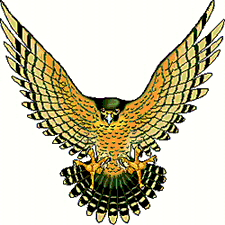  Meanwhile, the division
champion Golden Falcons and Sugar Bears get to sit this round out, sip
mojitos and wait for
their opponents. Arkansas will face the lowest-seeded team that
survives
the first round, meaning Newark will face Carolina if they advance, or
the winner of the Stanhope/Honolulu match-up if Tijuana pulls off the
upset against the Mudcats. During the bye week, the Falcs will stay
sharp by
playing scrimmages against Mark Zotti and the Bedminster A's, while the
Sugar Bears
will take on the Italian Olympic baseball team. Meanwhile, the division
champion Golden Falcons and Sugar Bears get to sit this round out, sip
mojitos and wait for
their opponents. Arkansas will face the lowest-seeded team that
survives
the first round, meaning Newark will face Carolina if they advance, or
the winner of the Stanhope/Honolulu match-up if Tijuana pulls off the
upset against the Mudcats. During the bye week, the Falcs will stay
sharp by
playing scrimmages against Mark Zotti and the Bedminster A's, while the
Sugar Bears
will take on the Italian Olympic baseball team.
|


 Every year needs a Cinderella story, and this
year the Fairy Godmother apparently visited Tijuana. After finishing
dead last in 2003 with a 66-96 record, the Banditos again looked like
they'd be playing golf again this October; as late as
Every year needs a Cinderella story, and this
year the Fairy Godmother apparently visited Tijuana. After finishing
dead last in 2003 with a 66-96 record, the Banditos again looked like
they'd be playing golf again this October; as late as  The offense is solid, ranking second in home
runs (232) and fifth in team batting average (.278); however, the fact
that they finished third in OPS (.805), OBP (.347), SLG (.458), runs
created (905.4) and total average (.765) suggests this lineup should
have generated even more than their fourth-best 853 runs. The key to
the offense is lead-off hitter and
The offense is solid, ranking second in home
runs (232) and fifth in team batting average (.278); however, the fact
that they finished third in OPS (.805), OBP (.347), SLG (.458), runs
created (905.4) and total average (.765) suggests this lineup should
have generated even more than their fourth-best 853 runs. The key to
the offense is lead-off hitter and  Ryan Franklin
Ryan Franklin But then again, why not play for the
three-run home run, when that's usually more than enough to win on any
given night? The Mudcats led the league in team ERA (3.48), quality
start percentage (.611) and fewest HR/9 (0.8); tied for first in R/9
(12.0); and ranked second in fewest H/9 (8.3). In a short series, this
pitching staff will be even better as they can narrow the rotation to
their top three starters. Tim Hudson (17-3,
2.08 ERA, 10.8 R/9) and Roy Halladay (18-7,
3.62 ERA, 10.2 R/9) are the likely starters for games 1 and 2, but what
to do next: Carlos Zambrano (11-13, 3.14 ERA,
11.2 R/9) or Barry Zito (18-4, 3.96 ERA, 13.3
R/9)? You can forget about Jake Westbrook (4-2,
4.33 ERA, 14.0 R/9) and Ron Villone (4-11,
6.22 ERA, 15.4 R/9)... The Mudcats' embarrassment of riches when it
comes to young arms also extends to the bullpen, where Francisco Cordero (6-3, 4 SV, 2.28 ERA, 9.9
R/9), Brandon Donnelly (5-7, 7 SV, 2.42 ERA,
11.9 R/9) and Ricardo Rincon (4-1, 2.67 ERA,
15.0 R/9) reign. Indeed, closer Rod Beck (3-9,
34 SV, 3.69 ERA, 11.9 R/9) may be the bullpen's weakest link -- unless,
that is, Paul Shuey (3-1, 4.20 ERA, 12.6 R/9)
or Ray King (5-3, 2 Sv, 4.96 ERA, 13.5 R/9)
are called upon for some reason.
But then again, why not play for the
three-run home run, when that's usually more than enough to win on any
given night? The Mudcats led the league in team ERA (3.48), quality
start percentage (.611) and fewest HR/9 (0.8); tied for first in R/9
(12.0); and ranked second in fewest H/9 (8.3). In a short series, this
pitching staff will be even better as they can narrow the rotation to
their top three starters. Tim Hudson (17-3,
2.08 ERA, 10.8 R/9) and Roy Halladay (18-7,
3.62 ERA, 10.2 R/9) are the likely starters for games 1 and 2, but what
to do next: Carlos Zambrano (11-13, 3.14 ERA,
11.2 R/9) or Barry Zito (18-4, 3.96 ERA, 13.3
R/9)? You can forget about Jake Westbrook (4-2,
4.33 ERA, 14.0 R/9) and Ron Villone (4-11,
6.22 ERA, 15.4 R/9)... The Mudcats' embarrassment of riches when it
comes to young arms also extends to the bullpen, where Francisco Cordero (6-3, 4 SV, 2.28 ERA, 9.9
R/9), Brandon Donnelly (5-7, 7 SV, 2.42 ERA,
11.9 R/9) and Ricardo Rincon (4-1, 2.67 ERA,
15.0 R/9) reign. Indeed, closer Rod Beck (3-9,
34 SV, 3.69 ERA, 11.9 R/9) may be the bullpen's weakest link -- unless,
that is, Paul Shuey (3-1, 4.20 ERA, 12.6 R/9)
or Ray King (5-3, 2 Sv, 4.96 ERA, 13.5 R/9)
are called upon for some reason. 
 For the
second consecutive year, the Sharks are the fifth-seed. In previous
years, that would be considered good news, as the No. 5 team
had upset the No. 4 team in all six years of the three-tiered
post-season. But last year, the string of upsets came to an end as
Honolulu, in their first-ever post-season appearance, were eliminated
by Carolina in a
For the
second consecutive year, the Sharks are the fifth-seed. In previous
years, that would be considered good news, as the No. 5 team
had upset the No. 4 team in all six years of the three-tiered
post-season. But last year, the string of upsets came to an end as
Honolulu, in their first-ever post-season appearance, were eliminated
by Carolina in a  One of Stanhope's regular season strengths,
the depth and quality of its starting rotation, won't help it much in
the five-game series, when only three starters will be able to pitch.
Manager Graig Nettles has the enviable task of
having to sort through some very good veterans when it comes to finding
his three starters. His ace this season was the team's top pick in this
year's draft (#26 overall), Wilson Alvarez,
who went 17-6 with a 3.52 ERA, 13.2 R/9; he'll likely start Game 1,
even though the Sharks, like the Mighty Men, are a much better team
against lefties (.554 W%) than they are against righties (.491 W%).
Backing up Alvarez will likely be the two starters the team traded for,
Estaban Loaiza (5-4, 4.01
ERA, 11.1 R/9 in 11 starts with Stanhope; 13-10, 4.52 ERA, 13.1 R/9
overall); and Mike Mussina (4-3, 4.16 ERA,
11.2 R/9 in 10 starts with Stanhope; 13-11, 4.43 ERA, 11.9 R/9
overall). Nettles' other choices are Brian Anderson
(10-10, 4.61 ERA, 13.5 R/9), Tim Wakefield (8-6,
5.18 ERA, 15.4 R/9), Matt Clement (9-7, 5.52
ERA, 15.1 R/9) or Kerry Wood (12-14, 5.62
ERA, 13.9 R/9), all talented pitchers having sub-par seasons... Whoever
starts Stanhope's games, there's no doubt as to who will finish them. Mariano Rivera didn't win the
One of Stanhope's regular season strengths,
the depth and quality of its starting rotation, won't help it much in
the five-game series, when only three starters will be able to pitch.
Manager Graig Nettles has the enviable task of
having to sort through some very good veterans when it comes to finding
his three starters. His ace this season was the team's top pick in this
year's draft (#26 overall), Wilson Alvarez,
who went 17-6 with a 3.52 ERA, 13.2 R/9; he'll likely start Game 1,
even though the Sharks, like the Mighty Men, are a much better team
against lefties (.554 W%) than they are against righties (.491 W%).
Backing up Alvarez will likely be the two starters the team traded for,
Estaban Loaiza (5-4, 4.01
ERA, 11.1 R/9 in 11 starts with Stanhope; 13-10, 4.52 ERA, 13.1 R/9
overall); and Mike Mussina (4-3, 4.16 ERA,
11.2 R/9 in 10 starts with Stanhope; 13-11, 4.43 ERA, 11.9 R/9
overall). Nettles' other choices are Brian Anderson
(10-10, 4.61 ERA, 13.5 R/9), Tim Wakefield (8-6,
5.18 ERA, 15.4 R/9), Matt Clement (9-7, 5.52
ERA, 15.1 R/9) or Kerry Wood (12-14, 5.62
ERA, 13.9 R/9), all talented pitchers having sub-par seasons... Whoever
starts Stanhope's games, there's no doubt as to who will finish them. Mariano Rivera didn't win the  Interestingly enough, they had the league's top
offense (495 RF) over the first half, but cooled to a fourth-best 426
runs over the second half, despite the addition of several sluggers via
trade. One of those new faces went on to have one of the most explosive
offensive seasons in DMBL history: Gary Sheffield, who hit .331 with a 1.039 OPS in 112
games with Stanhope (35 2B, 31 HR, 104 RBI). But just about every
hitter in the Mighty Man lineup had terrific stats this season: Milton Bradley (.327, 42 2B, 71 RBI); Carlos Lee (.312, 21 HR, 74 RBI); Todd Helton (.294, 43 2B, 111 RBI); Mike Lowell (.286, 47 HR, 107 RBI), Derek Jeter (.297, 28 2B, 112 R), Nick Johnson (.285, .870 OPS, 26 HR, 106 RBI) and
Jorge Posada (..285, 25 HR,
79 RBI) all put up the kind of numbers that would make them team MVP,
if they played for a team that didn't have Sheffield on it. And that
doesn't even include part-timers Brian Giles
(.271, 12 2B, 25 R in 52 G), Cliff Floyd
(.260, 22 HR, 63 RBI in 91 G) and Brad Wilkerson
(.298, .418 OBP, 25 R in 59 G).
Interestingly enough, they had the league's top
offense (495 RF) over the first half, but cooled to a fourth-best 426
runs over the second half, despite the addition of several sluggers via
trade. One of those new faces went on to have one of the most explosive
offensive seasons in DMBL history: Gary Sheffield, who hit .331 with a 1.039 OPS in 112
games with Stanhope (35 2B, 31 HR, 104 RBI). But just about every
hitter in the Mighty Man lineup had terrific stats this season: Milton Bradley (.327, 42 2B, 71 RBI); Carlos Lee (.312, 21 HR, 74 RBI); Todd Helton (.294, 43 2B, 111 RBI); Mike Lowell (.286, 47 HR, 107 RBI), Derek Jeter (.297, 28 2B, 112 R), Nick Johnson (.285, .870 OPS, 26 HR, 106 RBI) and
Jorge Posada (..285, 25 HR,
79 RBI) all put up the kind of numbers that would make them team MVP,
if they played for a team that didn't have Sheffield on it. And that
doesn't even include part-timers Brian Giles
(.271, 12 2B, 25 R in 52 G), Cliff Floyd
(.260, 22 HR, 63 RBI in 91 G) and Brad Wilkerson
(.298, .418 OBP, 25 R in 59 G).  Coming out of nowhere to anchor the rotation
this year was Jason Schmidt (13-11, 3.54 ERA,
10.1 R/9), who had been 12-23 with a 5.39 ERA over his previous two
seasons with the Sharks, and 36-54 with a 5.32 ERA over his five-year,
six-team DMBL career. But the 30-year-old right-hander impressively led
the DMBL in fewest BR/9 (10.1), and finished 2nd in H/9 (7.5); 3rd in
QS% (.742); 7th in ERA (3.54) and strikeouts (203); 8th in innings
(224.0); tied for 8th in complete games (4); and tied for 9th in K/9
(8.2). Schmidt and 25-year-old Roy Oswalt
(13-13, 4.02 ERA,
11.8 R/9) will probably start the first two games, but who
will they start in
Game 3? Lefties Mark Mulder (11-12, 4.56 ERA,
13.0 R/9) and Ted Lilly (8-12, 5.25 ERA, 13.4
R/9) may have bright futures ahead of them, but their regular season
numbers inspire little confidence. The Sharks are also tempting fate by
sending any southpaw out against Stanhope's lefty-killing lineup; the
Mighty Men went a league-best 35-12 (.745 W%) against them this season.
That alone might be reason enough to turn to Russ
Ortiz (11-15, 4.70 ERA, 12.2 R/9) in Game 3, and then hope the long
intercontinental flight is enough time for Schmidt and Oswalt to rest
up for Games 4 and 5, if necessary. Spot starter Jason
Johnson (2-4, 7.22 ERA, 17.9 R/9) probably won't even make the
post-season roster, let alone the rotation... But if the Shark starters
can survive the first six innings of the game, they have an excellent
chance of winning the game: Honolulu had the league's second-best
record (65-3) when ahead after seven innings, and had the league's
second-best record (26-18) in one-run games. Veteran closer Ugueth Urbina (5-6, 28 SV, 3.58
ERA, 10.0 R/9) is solid, but the real strength in the bullpen is the
one-two punch of lefty Kelly Wunsch (3-3, 4
SV, 13 holds, 2.72 ERA, 11.9 R/9, .333 IR%)
and righty Rafael Soriano (9-1, 4 SV, 13
holds, 2.51 ERA, 8.0 R/9, .233 IR%).
Coming out of nowhere to anchor the rotation
this year was Jason Schmidt (13-11, 3.54 ERA,
10.1 R/9), who had been 12-23 with a 5.39 ERA over his previous two
seasons with the Sharks, and 36-54 with a 5.32 ERA over his five-year,
six-team DMBL career. But the 30-year-old right-hander impressively led
the DMBL in fewest BR/9 (10.1), and finished 2nd in H/9 (7.5); 3rd in
QS% (.742); 7th in ERA (3.54) and strikeouts (203); 8th in innings
(224.0); tied for 8th in complete games (4); and tied for 9th in K/9
(8.2). Schmidt and 25-year-old Roy Oswalt
(13-13, 4.02 ERA,
11.8 R/9) will probably start the first two games, but who
will they start in
Game 3? Lefties Mark Mulder (11-12, 4.56 ERA,
13.0 R/9) and Ted Lilly (8-12, 5.25 ERA, 13.4
R/9) may have bright futures ahead of them, but their regular season
numbers inspire little confidence. The Sharks are also tempting fate by
sending any southpaw out against Stanhope's lefty-killing lineup; the
Mighty Men went a league-best 35-12 (.745 W%) against them this season.
That alone might be reason enough to turn to Russ
Ortiz (11-15, 4.70 ERA, 12.2 R/9) in Game 3, and then hope the long
intercontinental flight is enough time for Schmidt and Oswalt to rest
up for Games 4 and 5, if necessary. Spot starter Jason
Johnson (2-4, 7.22 ERA, 17.9 R/9) probably won't even make the
post-season roster, let alone the rotation... But if the Shark starters
can survive the first six innings of the game, they have an excellent
chance of winning the game: Honolulu had the league's second-best
record (65-3) when ahead after seven innings, and had the league's
second-best record (26-18) in one-run games. Veteran closer Ugueth Urbina (5-6, 28 SV, 3.58
ERA, 10.0 R/9) is solid, but the real strength in the bullpen is the
one-two punch of lefty Kelly Wunsch (3-3, 4
SV, 13 holds, 2.72 ERA, 11.9 R/9, .333 IR%)
and righty Rafael Soriano (9-1, 4 SV, 13
holds, 2.51 ERA, 8.0 R/9, .233 IR%). But the Sharks do some things right on offense:
They finished 5th in most walks (536), 4th in fewest strikeouts (991)
and 2nd in best stolen base percentage (.807). The strategy, then,
appears to be simple: Work the pitcher for a walk, steal second, and
then wait for Jason Giambi to come to the
plate. For the second straight season, "The Giambino" was the Sharks'
only offensive weapon, leading the team in OBP (.429), SLG (.608), OPS
(1.038), home runs (50), runs (112), runs created (147.4), total
average (1.213), secondary average (.618), extra base hits (76), total
bases (312), walks (140) and, naturally, intentional walks (15) --
despite hitting just .263, and striking out 134 times. In fact, Giambi
led the league in home runs, walks and secondary average, was second in
OBP and total average, tied for second in OPS, and third in SLG and
runs created. One can only imagine what kind of damage he would have
done with some more protection in the lineup. But while his teammates
did not put up huge numbers this regular season, there are some proven
big-name hitters capable of sending any starting pitcher to an early
shower: Miguel Tejada (.268, .752 OPS, 21 HR,
85 RBI), Shawn Green (.248, .764 OPS, 40 2B,
106 RBI), Jacques Jones (.272, .717 OPS, 20
HR, 69 RBI), Joe Randa (.233, .634 OPS, 23 2B,
54 RBI) and Jason Kendall (.268, .361 OBP, 53
R). If one of those guys, or first-round bust Bo
Hart (.229, .590 OPS), starts hitting up to their potential,
Honolulu's morbid offense would suddenly look a lot more dangerous.
But the Sharks do some things right on offense:
They finished 5th in most walks (536), 4th in fewest strikeouts (991)
and 2nd in best stolen base percentage (.807). The strategy, then,
appears to be simple: Work the pitcher for a walk, steal second, and
then wait for Jason Giambi to come to the
plate. For the second straight season, "The Giambino" was the Sharks'
only offensive weapon, leading the team in OBP (.429), SLG (.608), OPS
(1.038), home runs (50), runs (112), runs created (147.4), total
average (1.213), secondary average (.618), extra base hits (76), total
bases (312), walks (140) and, naturally, intentional walks (15) --
despite hitting just .263, and striking out 134 times. In fact, Giambi
led the league in home runs, walks and secondary average, was second in
OBP and total average, tied for second in OPS, and third in SLG and
runs created. One can only imagine what kind of damage he would have
done with some more protection in the lineup. But while his teammates
did not put up huge numbers this regular season, there are some proven
big-name hitters capable of sending any starting pitcher to an early
shower: Miguel Tejada (.268, .752 OPS, 21 HR,
85 RBI), Shawn Green (.248, .764 OPS, 40 2B,
106 RBI), Jacques Jones (.272, .717 OPS, 20
HR, 69 RBI), Joe Randa (.233, .634 OPS, 23 2B,
54 RBI) and Jason Kendall (.268, .361 OBP, 53
R). If one of those guys, or first-round bust Bo
Hart (.229, .590 OPS), starts hitting up to their potential,
Honolulu's morbid offense would suddenly look a lot more dangerous. 
 Meanwhile, the division
champion Golden Falcons and Sugar Bears get to sit this round out, sip
mojitos and wait for
their opponents. Arkansas will face the lowest-seeded team that
survives
the first round, meaning Newark will face Carolina if they advance, or
the winner of the Stanhope/Honolulu match-up if Tijuana pulls off the
upset against the Mudcats. During the bye week, the Falcs will stay
sharp by
playing scrimmages against Mark Zotti and the Bedminster A's, while the
Sugar Bears
will take on the Italian Olympic baseball team.
Meanwhile, the division
champion Golden Falcons and Sugar Bears get to sit this round out, sip
mojitos and wait for
their opponents. Arkansas will face the lowest-seeded team that
survives
the first round, meaning Newark will face Carolina if they advance, or
the winner of the Stanhope/Honolulu match-up if Tijuana pulls off the
upset against the Mudcats. During the bye week, the Falcs will stay
sharp by
playing scrimmages against Mark Zotti and the Bedminster A's, while the
Sugar Bears
will take on the Italian Olympic baseball team.